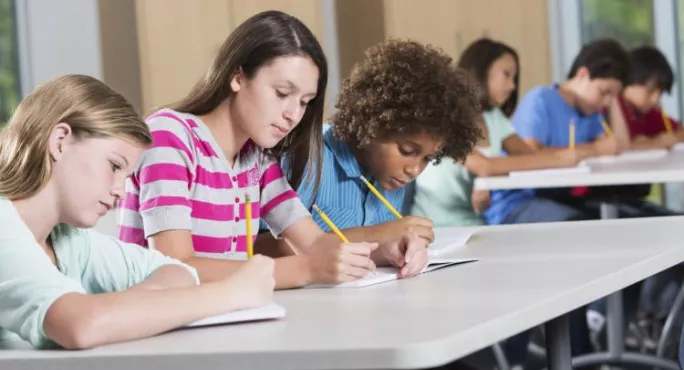- Home
- Coronavirus: Could Covid-19 end GCSEs forever?
Coronavirus: Could Covid-19 end GCSEs forever?

“Exams will not take place as planned in May and June, though we will make sure that pupils get the qualifications they need and deserve for their academic career.”
The prime minister had little more to say than that on GCSEs and A levels when he dropped his bombshell about cancelling exams on Wednesday. And it is abundantly clear why.
If there was an obvious solution then it would have been stated there and then. The public desperately want certainty and ministers are keen to oblige if at all possible.
But in this case they couldn’t, because there is no way easy way out of this one. As yesterday progressed, a combination of the limited range of unsatisfactory options came to the fore - a mixture of predicted grades, mock exam results and teacher assessment. But it will be far from satisfactory.
Coronavirus: Teacher assessment likely to replace exams
Cancellation: No GCSEs and A levels, says PM
Warning: Running exams and Sats this summer ‘not credible’
Critics like NEU leader Kevin Courtney have been quick to say we told you so. They point out that the sharp turn towards predominantly end-of-course GCSEs and A levels under Michael Gove has left our system particularly ill-equipped to deal with the predicament that it now faces.
And they are right in the sense that the old modular assessment system jettisoned by Gove and his adviser Dominic Cummings would have left us with much more to go on when it came to picking up the pieces from a school year abruptly truncated by Covid-19.
How will coronavirus impact on our exam system?
But that does not mean that the problems that came with the teacher assessed coursework under the old system should be ignored.
Dropping teacher assessment wasn’t simply about introducing a more traditional assessment system - it was also done because teacher assessment had been shown to be inconsistent and subjective.
Already, fresh examples are surfacing under our new forced reality. The teacher, for example, who this week had been told by his head to “make a better guess” at his Year 11 predicted grades, grades that had been based on his best judgement.
It is to be hoped that the concerns from his head were not about school accountability. That really ought to be needless. Department for Education floor standards are gone, and surely the cobbled together grades that pupils will be provided with in August cannot be used as the basis for school performance tables or be considered for future Ofsted inspections?
It is much more likely that the head was motivated by wanting to give his pupils the best possible chance in later life. And therein lies what has been seen as the essential problem with teacher assessment - it is not objective and is based on human judgement. If teachers all want to give their pupils the benefit of the doubt then it will fuel grade inflation.
Teacher assessment ‘back with a vengeance’
But, like it or not, it seems that teacher assessment is going to be back with a vengeance. Our entire system has been geared towards end-of-year exams and now we’re going to see a mass enforced experiment into what happens when you end them.
So if the sky doesn’t fall in then could this become our new normal? At this stage, the idea that such a makeshift-and-mend solution could last seems just plain bizarre. It suits no one.
The coronavirus generation will be given grades like no other cohorts, decided more on the basis of someone’s judgement of their potential performance than their actual performance. The painstakingly constructed exams system designed to standardise grades from year to year and prevent grade inflation will be gone at a stroke.
But once you junk these sacred cows, what have you left? If teacher assessment does produce something that ends up feeling workable then is there any reason to go back to the artificial stress of exams?
Yes, obviously, there is. Because, despite the anxiety it provokes, the exams system has to a large extent worked - on its own terms at least - and those in charge will want it to remain.
The demise of GCSEs?
But it easy to see how this year’s events could hasten its eventual and inevitable demise. And if a loss of exam fees this year puts more pressure on exam boards already financially stretched by the development costs of the recent huge wave of reform, after the cut to their income caused by the end of modular exams, then there will be huge incentive for a cheaper system.
Shipping exam papers around the country is expensive. And technology and the possibility of continuous adaptive testing mean there is already a less costly replacement waiting in the wings.
If there is a big shift in that direction then GCSEs would surely be the first to go. In recent years a growing number of voices, perhaps forgetting that large number of pupils still don’t go on and take A levels, have argued that they have become a pointless enterprise.
There are important arguments for keeping GCSEs and it is early days to be predicting such a major change. But the consequences of the coronavirus outbreak will be far-reaching. And in education, as pupils get used to remote learning, the idea that it could finally trigger the end of pen-and-paper GCSEs has got to be a possibility.
Keep reading for just £1 per month
You've reached your limit of free articles this month. Subscribe for £1 per month for three months and get:
- Unlimited access to all Tes magazine content
- Exclusive subscriber-only stories
- Award-winning email newsletters



